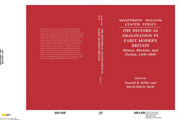Book contents
- Frontmatter
- Contents
- Preface
- WOODROW WILSON CENTER SERIES
- 1 Introduction
- 2 Precept, example, and truth: Degory Wheare and the ars historica
- 3 Truth, lies, and fiction in sixteenth-century Protestant historiography
- 4 Thomas More and the English Renaissance: History and fiction in Utopia
- 5 Little Crosby and the horizons of early modern historical culture
- 6 Murder in Faversham: Holinshed's impertinent history
- 7 Foul, his wife, the mayor, and Foul's mare: The power of anecdote in Tudor historiography
- 8 Experience, truth, and natural history in early English gardening books
- 9 Thomas Hobbes's Machiavellian moments
- 10 The background of Hobbes's Behemoth
- 11 Leviathan, mythic history, and national historiography
- 12 Protesting fiction, constructing history
- 13 Adam Smith and the history of private life: Social and sentimental narratives in eighteenth-century historiography
- 14 Contemplative heroes and Gibbon's historical imagination
- Contributors
- Index
- Titles in the series
11 - Leviathan, mythic history, and national historiography
Published online by Cambridge University Press: 04 August 2010
- Frontmatter
- Contents
- Preface
- WOODROW WILSON CENTER SERIES
- 1 Introduction
- 2 Precept, example, and truth: Degory Wheare and the ars historica
- 3 Truth, lies, and fiction in sixteenth-century Protestant historiography
- 4 Thomas More and the English Renaissance: History and fiction in Utopia
- 5 Little Crosby and the horizons of early modern historical culture
- 6 Murder in Faversham: Holinshed's impertinent history
- 7 Foul, his wife, the mayor, and Foul's mare: The power of anecdote in Tudor historiography
- 8 Experience, truth, and natural history in early English gardening books
- 9 Thomas Hobbes's Machiavellian moments
- 10 The background of Hobbes's Behemoth
- 11 Leviathan, mythic history, and national historiography
- 12 Protesting fiction, constructing history
- 13 Adam Smith and the history of private life: Social and sentimental narratives in eighteenth-century historiography
- 14 Contemplative heroes and Gibbon's historical imagination
- Contributors
- Index
- Titles in the series
Summary
I have attempted (with what Successe I submit to the Reader) to collect out of Sundrie Authors the Philosophicall sense of these fables of Ouid, if I may call them his, when most of them are more antient then any extant Author, or perhaps then Letters themselves; before which, as they expressed their Conceptions in Hieroglyphics, so did they their Philosophic and Diuinite under the Fables and Parables: a way not un-trod by the sacred Pen-men; as by the prudent Law-giuers, in their reducing of the old World to ciuilitie, leauing behind a deeper impression, then can be made by the liuelesse precepts of Philosophie.
- George Sandys, preface to the reader to Ovid's Metamorphosis Englished, Mythologiz'd and Represented in FiguresHOBBES, SANDYS, DAVENANT, AND THE VIRGINIA COMPANY
The Virginia Company of London records in its official minutes that in 1623 George Sandys, newly appointed treasurer of that company, while crossing the Atlantic to take up his post, “amongst the rorering of the seas, the rustling of the Shroude, and the clamour of the sailors,” accomplished the translation of the first two books of Ovid's Metamorphoses. Once in Virginia he translated eight more, taking the completed manuscript with him on his return to England, where it was published in 1626 and republished in 1632. Believed to be the first work of poetry in the English language written in the Americas, the first edition is no longer extant, the Folger Shakespeare Library in Washington, D.C., holding the only known copy of the second edition.
- Type
- Chapter
- Information
- The Historical Imagination in Early Modern BritainHistory, Rhetoric, and Fiction, 1500–1800, pp. 267 - 297Publisher: Cambridge University PressPrint publication year: 1997
- 4
- Cited by

